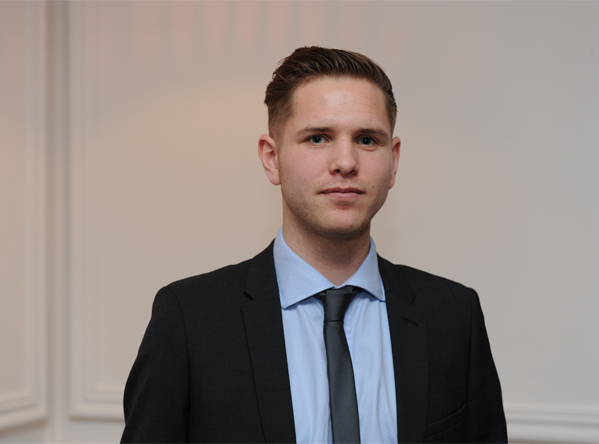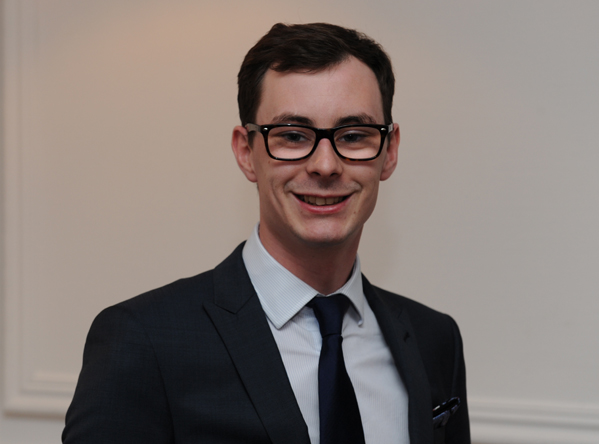One hundred new Institution members from Greater London, the south and east of England celebrated their achievements at a ceremony at One Birdcage Walk last month. Among them were EngTech Members Joshua Humphrey and Michael Pateman.
Passionate about working in engineering Joshua Humphrey EngTech MIMechE and Michael Pateman EngTech MIMechE are eloquent and engaging advocates for the benefits of gaining professional registration with the Institution of Mechanical Engineers. Their career paths to date have been different, and as such, they offer a great insight into the diverse routes into professional engineering today.
It was a childhood fascination with objects and their designs which got Michael Pateman thinking about the possibilities of engineering. He said: “I first became interested in the engineering profession unwittingly from a very young age when I would regularly take apart all manner of objects around me just to see how they worked and then as I grew older how they could be improved.”
“It was around the age of 16 that I first realised that the engineering profession was the career I wished to follow, growing from my love of improving products and devices around me to help the end user. I like the notion that now at this fledgling stage of my career, the skills I have learned could be applied to a plethora of different situations and as a result I could potentially work on some very exciting and interesting projects.”
Joshua, too, had always had a fascination with how things work. He said: “At school I did a GCSE double award in engineering and it was from there that I decided that a career in engineering was for me. I chose the University of Portsmouth for a few reasons. First, it offers great opportunities for getting students into the workplace after graduation and has good ties with industry. Secondly, when I went to an open day there, I found the lecturers and tutors very approachable and friendly, and that really appealed to me.”

Whilst at university, Michael completed a vast array of projects, which included 3D design, advanced material selection and manufacture. He also completed a simulated Formula Student project. He observed: “I found this group project very interesting. Involving a large amount of real-world skills, the initial brief for the engineering department was to design a Formula Student car adhering to the strict competition guidelines. We were then split into groups of six and given a part of section of the car to develop including the chassis, steering and bodywork.”
“This was a great project as we had to delegate within our groups to best utilise our strengths - something that I thrived on having been elected my group leader. I learned a large amount about time management as well as planning a project to coincide with other converging parts.”
Michael and Joshua undertook their industrial placements at the same company: Elta Fans, an industrial fan manufacturer. Michael talked about his rationale for selecting this particular company: “Coming from a product design background I chose to pursue a placement in an engineering firm purely because I am a strong believer that function is far more important than form especially in the development stage of a product.”
Joshua said: “I worked in the Research and Development department. My main role as an Undergraduate Engineer was performing performance and acoustic tests to British Standards on new prototype fans. The projects were very dynamic, projects varied from new ultra efficient impeller designs to large fabricated agricultural fans. So not only did I and the rest of the team have to test these prototypes, but also build various novel apparatus to attach these fans to the testing equipment.”
Michael, who also worked in the Research and Development department, added: “Whilst completing this placement I learned a huge amount of fundamental engineering practices ranging from simple tolerances and torque settings to basic welding and sheet metal fabrication. I was given the chance to work on existing products and prototypes completing extensive testing. In this regard, a key skill I homed was the ability to plan out testing procedures and completing them accurately whilst gaining the most information possible. I also learned a large amount about sheet metal and unique fabrication techniques as we had to build custom test rigs complying with ISO standards.”

Joshua spoke eloquently about the benefits to his career of working in industry as part of his degree course, and gaining professional registration while still at university. He said: “My initial intentions in doing a placement year were to gain industrial experience while being at university, to better my chances in seeking employment after graduating. Although when I started at university I found out about EngTech and the benefits of being professionally registered.”
“John Bishop FIMechE, my placement tutor, actively encouraged me to apply for my EngTech. He also visited us twice at our placement to check that everything was going well and that we were getting the valuable experience that we needed to meet the EngTech criteria. The university also pays our membership fees for the first year of professional registration.”
“My primary reason for becoming professionally registered was the opportunity of becoming an elected member of the Institution of Mechanical Engineers while being at university and having access to the benefits of being a full member. I also felt that in getting my EngTech was the first step to becoming a Charted Engineer.”
He concluded: “Professional registration is an excellent opportunity that shouldn’t be missed if you have completed a placement year or have industrial experience prior to going to university. It enables you to take a more active role at the Institution and is a great first step on the route to becoming chartered. It also shows future potential employers of your commitment to personal and professional development and your commitment to your career in engineering.”
Set to complete his studies this summer, Joshua has secured his first graduate job. Despite having a first class honours degree, Michael is still seeking his first position. He said: “Since graduating I have applied for and been offered several positions but I have yet to find a position that I wished to begin my career with. I have, however, been working as an installation engineer, installing technology products in public buildings such as projectors, smart boards and the general cabling that is associated with these products. I am however looking for a design engineering position; I feel this would best suit my skill set and it is an area that I would love to start my career in as it would give me a chance to use my more innovative skills as well as the grounded engineering principles to solve real-world problems.”
Michael has no doubt that being professionally registered with the Institution of Mechanical Engineers will give him competitive edge and will demonstrate both his credentials and his commitment to employers. He said: “From my experiences, people do see professional registration as a sign of professionalism. It shows that as an individual you care about your career path and ultimately your work. Clearly there are large benefits to having professional registration. I would encourage people by pointing out the community aspect of the Institution combined with the wealth of information that can be gleaned from all of the services the Institution offers.”
“I chose to become professionally registered as I feel it is a good indicator of the kind of person you are and wish to be. It shows that you wish to progress your career and also take pride in the work you complete. I chose the IMechE over some other institutions as it is the most established and, in my opinion, the most well-respected engineering institution. It meant a great deal to become professionally registered as it proves to myself that my work has been to a recognised standard and that in itself is something to be proud of.”
Joshua agreed, adding: “I think it is important to maintain continuous development; you can never stop learning and improving yourself. As engineers, we have to keep track of the advancements in engineering, science and technology to ensure that we are using them to their full potential and continuing to improve them even further: for the benefit of industry and for the benefit of society.”
For more information:
www.imeche.org/engtech